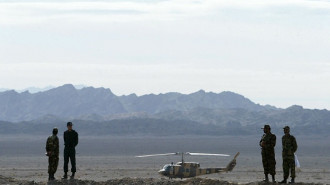Trump ends sanction waivers for Iran oil importers
The US will no longer grant sanctions exemptions to Iran's oil customers, potentially punishing allies such as India as it tries to squeeze Tehran's top export, President Donald Trump announced on Monday.
The White House said that Saudi Arabia and the UAE - both back Trump's hawkish stance against regional rival Iran - would work to make up the difference in oil to ensure that global markets are not rocked.
"Today we are announcing the United States will not issue any additional Significant Reduction Exceptions to existing importers of Iranian oil," US Secretary of State Mike Pompeo said in a statement.
"The Trump Administration has taken Iran's oil exports to historic lows, and we are dramatically accelerating our pressure campaign in a calibrated way that meets our national security objectives while maintaining well supplied global oil markets," Pompeo added.
The White House said that the Trump administration's decision was intended to "bring Iran's exports to zero, denying the regime its principal source of revenue".
Twitter Post
|
Eight governments were initially given six-month reprieves from the unilateral US sanctions on Iran. They include India, which has warm ties with Washington but disagrees on the US insistence that Iran is a threat.
Other countries that will be affected include China and Turkey, opening up new friction in contentious relationships if the US goes ahead with sanctions over buying Iranian oil.
The others - Greece, Italy, Japan, South Korea and Taiwan - have already heavily reduced their purchases from Iran.
Trump last year withdrew Washington from an accord negotiated by his predecessor, Barack Obama, under which Iran drastically scaled back its nuclear programme in return for promises of sanctions relief.
The Trump administration, backed by Saudi Arabia and Israel, has instead unilaterally imposed sanctions and demanded that other countries follow suit.
US officials say that they are aiming at choking off Iranian revenue so as to reduce the clerical regime's regional clout, notably its support for militants groups such as Lebanon's Hizballah.
Agencies contributed to this report.

![Palestinians mourned the victims of an Israeli strike on Deir al-Balah [Getty]](/sites/default/files/styles/image_684x385/public/2024-11/GettyImages-2182362043.jpg?h=199d8c1f&itok=xSHZFbmc)


![The law could be enforced against teachers without prior notice [Getty]](/sites/default/files/styles/image_684x385/public/2178740715.jpeg?h=a5f2f23a&itok=hnqrCS4x)
 Follow the Middle East's top stories in English at The New Arab on Google News
Follow the Middle East's top stories in English at The New Arab on Google News
![Fakhrizadeh [AFP] Fakhrizadeh [AFP]](/sites/default/files/styles/image_330x185/public/media/images/774C39F7-8F7A-4D67-B998-27D102FCB4A7.png?h=d1cb525d&itok=j9eGvunV)

